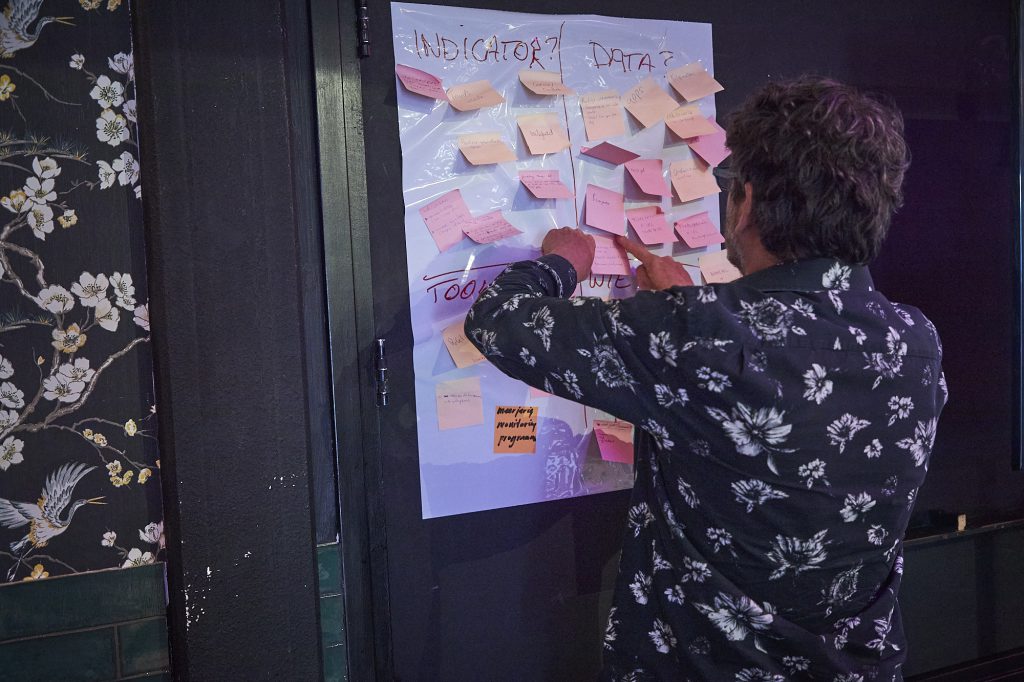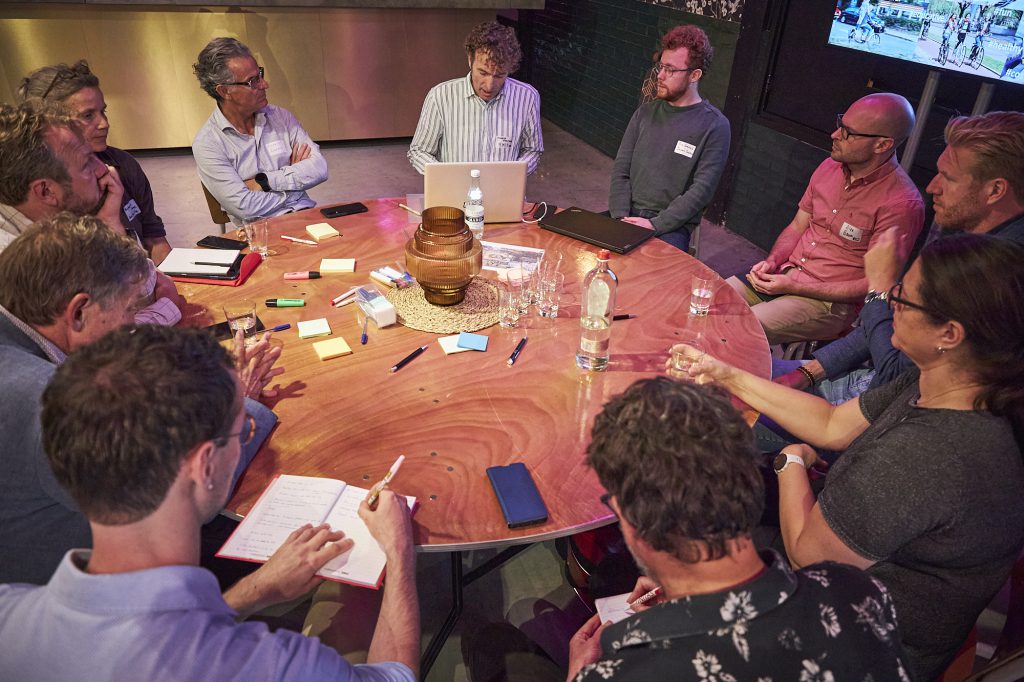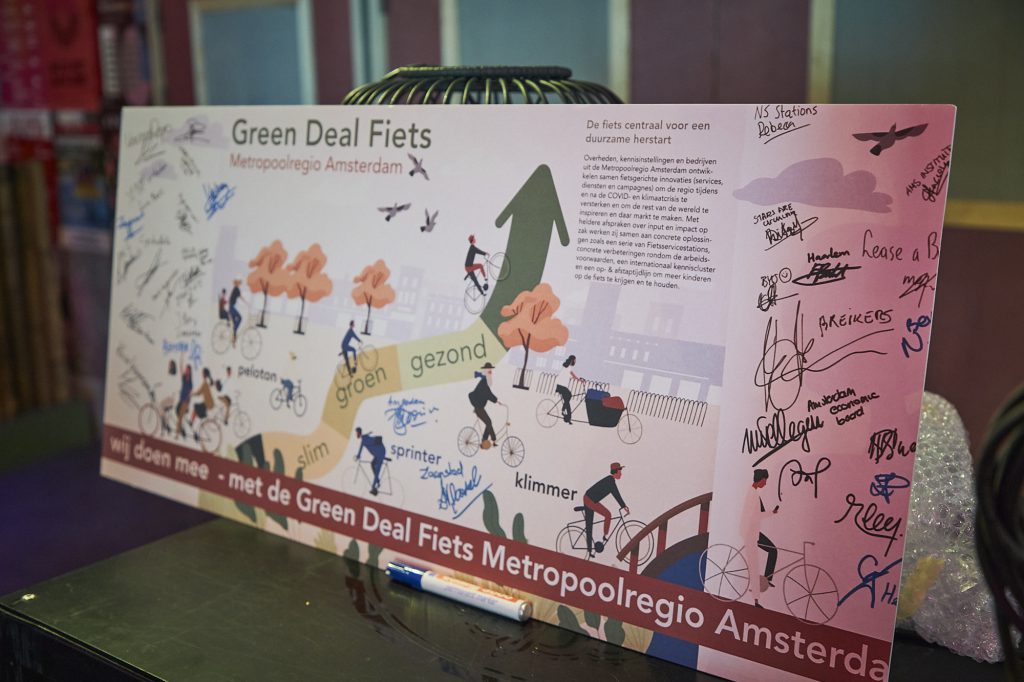Ambities van de buitencategorie: 100.000 extra fietsers in de regio
De fiets is een duurzame oplossing voor veel van de uitdagingen in de Metropool Amsterdam. Logisch dus dat de Green Deal Fiets een stevige ambitie heeft: 100.000 extra fietsers in de regio. Bij de laatste meetup voor de zomer pompen we de banden weer even goed op.
De economie profiteert van meer fietsers, evenals de infrastructuur, het milieu en — misschien wel het belangrijkst — onze gezondheid. En dan zijn er ook nog allerlei sociale redenen om fietsgebruik te stimuleren.
Om dat voor elkaar te krijgen is een sterk netwerk nodig. En daar wordt hard aan gewerkt door de aanwezigen vandaag bij de Meetup Green Deal Fiets. Frans Hasselaar, coördinator MRA Fiets en een van de initiatiefnemers van de Green Deal Fiets: "De belangrijkste factoren voor het slagen van innovatie zijn crossovers tussen sectoren, tussen overheid, bedrijfsleven en onderwijs. Innovaties slagen door ideeën te combineren, daarom brengen we hier iedereen rondom de fiets bij elkaar."
Ken jij of ben jij iemand die niet mag missen in het sterke netwerk rondom de Green Deal Fiets? Stuur een mailtje naar Richard Hoving.
Bekijk hier de presentatie van de Green Deal Fiets Meetup en bekijk hier alle foto's van de inspirerende ochtend.
Fietsconvenant en fietswerkplan
Momenteel wordt er in de Green Deal Fiets gewerkt aan een convenant en werkplan. Het kernteam van de Green Deal Fiets bestaat uit de Board, de Metropoolregio Amsterdam en BYCS. Wethouders Marja Ruigrok (Haarlemmermeer) en Bram Diepstraten (Velsen) zijn de 'bestuurlijke fietstandem'. En dan zijn er ook nog vier themagroepen met elk een teamcaptain en actieve deelnemers in de vorm van sprinters en klimmers.
De vier thema's waar de Green Deal zich op richt zijn fietsservicepunten, fietsvriendelijke arbeidsvoorwaarden, kennisbundeling en kind & fiets. In deelsessies gaan we vandaag met die onderwerpen aan de slag.
(Tekst gaat verder onder de foto)
Fietsservicepunten
In het eerste kwartaal van 2023 opent bij Schiphol-Noord het eerste fietsservicepunt in de Metropool Amsterdam. En als het aan Sander Buningh ligt is over vijf jaar een fietsservicepunt de normaalste zaak van de wereld. Bij zo'n servicepunt kunnen forensen van het ov of de auto overstappen op een (deel)fiets, hun fiets laten repareren, koffie drinken, werken.
Buningh is business developer bij BAM Infra en team captain van dit deelthema binnen de Green Deal Fiets. Hij is ook de opdrachtgever van Puck Loendersloot die voor haar afstuderen onderzoek deed naar nut en noodzaak van en mogelijkheden voor fietsservicepunten. Zij vond zo'n vijftien geschikte locaties in de metropoolregio. Tijdens de meetup sessie werden daar nog twee mogelijk geschikte locaties aan toegevoegd. Deelnemers van gemeente Almere en Amstelveen/Aalsmeer noemden busstations Aalsmeer en Almere 't Oor.
In de deelsessie over het onderwerp legt ze uit dat haar onderzoek vooral verkennend was. "Omdat het nog niet bestaat is het lastig om te begrijpen wat zo'n fietsservicepunt nou echt is, hoe duurzaam het is en wat het kan opleveren. Daarom is het belangrijk dat we snel de eerste openen." Er wordt bijvoorbeeld nog gezocht naar het juiste model: moet het helemaal commercieel, moet de overheid hier het voortouw in nemen, kunnen we gebruik maken van arbeidsmarktssubsidies?
De focus bij de fietsservicepunten ligt op de forens, maar recreanten zijn ook welkom. "Ik kan me voorstellen dat het juist recreanten en wielrenners zijn die straks van de horeca gebruik maken, helemaal als je dit ook opneemt in fietsroute-apps. De forens wil toch snel door", zegt iemand. Buningh denkt dat zeker ook: "Maar onze businesscase richt zich op de forens, zij vormen de basis. De recreatieve fietsers en evenementenverkeer zijn straks de plusjes."
Kind & fiets
Wie als kind leert fietsen verleert dat nooit meer. Logisch dus dat aandacht voor kinderen een belangrijk deel vormt van de Green Deal Fiets. En dit werd recent met de nationale Tour de Force Innovatieprijs beloond. Thema-aanvoerder Remko Pijnaker, oprichter van Groeifiets, vertelt over twee succesvolle pilots bij kinderopvangorganisaties. Eerder deze maand won dit initiatief nog de nationale Tour de Force Innovatieprijs. Na de zomer staan er nog andere pilots gepland en iedereen die iets in zijn of haar gemeente wil opstarten is van harte welkom zich bij Pijnaker te melden.
(Tekst gaat verder onder de video)
Aan tafel ontstaat al snel een mooi consortium van Groeifiets, de Fietsersbond en Nexttechnician, dat onder meer techniekexcursies organiseert voor middelbare scholieren. "Daar blijkt het steeds weer lastig om met scholieren naar locaties te gaan, misschien kunnen we wel gaan fietsen", zegt Jacques Neefs. "Maar niet iedereen heeft een fiets en niet iedereen kan fietsen."
Neefs' ambitie sluit aan bij het Fietsersbondprogramma Voor ieder kind een fiets!, dat in verschillende regio's een verschillende uitvoering zal krijgen, waar Esther van Garderen over vertelt. In Utrecht krijgen kinderen met een stadspas bijvoorbeeld een opgeknapte fiets die ze kunnen omruilen als de fiets te klein wordt. Ook leren ze een band plakken en kleine reparaties uitvoeren.
Kennisbundeling rondom de fiets
De impact van de fiets is veel groter dan we al weten en waarschijnlijk groter dan we denken, zegt Maarten Woolthuis, co-founder van BYCS. Samen met het Impact Institute zoekt hij daarom naar methodes om het effect van fietsgebruik te kwantificeren. "Het blijft moeilijk om partijen te overtuigen van het belang van de fiets, daarom moeten we een framework hebben waarmee we beslissers de moed kunnen geven om vol in te zetten op de fiets."
Impact meten maakt het makkelijker om ontwikkelingen te vergelijken, voorkomt bias en inconsistentie en maakt de interpretatie van data zinvoller, zo vertelt Roy Verkaik van het Impact Institute even later in de deelsessie. BYCS en Impact Institute gaan Impact Measurement Framework de komende tijd verder uitwerken, nadenken over bredere toepassing en stakeholders motiveren.
In het gesprek gaat het over de tools, data, monitoring en mensen die nodig zijn om meer beslissers te bereiken. Aan data en tools ontbreekt het niet, zo stellen de aanwezigen vast. En een van hen vertelt over de fietsviewer in Den Haag, een mooi monitoringssysteem. "Je zou zeggen dat dat makkelijk gekopieerd kan worden door andere systemen, maar dat gebeurt eigenlijk niet."
(Tekst gaat verder onder de foto)
BYCS gaat samen met Impact Institute en de deelnemers aan de sessie het Impact Measurement Framework verder uitwerken, nadenken over bredere toepassing en stakeholders motiveren.
Impact wordt daarbij benaderd als een sturingsmiddel tijdens de hele customer journey naar het doel (meer fietsgebruik), niet zozeer als een verantwoordingsmiddel achteraf.
Bekijk hier de presentatie van de breakout sessie Kennisbundeling. En bekijk hier het Impact Measurement Framework.
Fiets in de arbeidsvoorwaarden
"De e-bike is een gamechanger", zegt Jennifer Woltjer, commercieel projectmanager bij Lease-a-Bike. "Met een e-bike zijn we bereid om 15 kilometer naar ons werk te fietsen en 52 procent van werkend Nederland woont in die reikwijdte."
Haar boodschap? De fiets kan heel eenvoudig aan de arbeidsvoorwaarden worden toegevoegd. In haar deelsessie laat ze Rogier Stout van de provincie Groningen aan het woord. Voor hem en zijn collega's is de fiets sinds april onderdeel van het arbeidsvoorwaardenpakket. De aanwezigen vragen Stout het hemd van het lijf. Over het succes — dat is groot, al 10 procent doet mee en de reacties zijn positief. Over de bijtelling — of die niet afschrikwekkend werkt, vraagt iemand, maar Stout heeft hier nog niets negatiefs over gehoord. En over de maximumvergoeding — de provincie betaalt 50 procent voor fietsen tot 6.000 euro, daarboven betaalt de werknemers 100 procent van de kosten.
Bekijk hier de Whitepaper: Leasefietsregeling voor gemeenten. En bekijk hier de Whitepaper: Leasefietsregeling voor bedrijven.
Kennis en inspiratie
De aanwezige sprinters, klimmers en pelotonsleden van de Green Deal Fiets hebben vandaag weer een hoop kennis gedeeld en inspiratie opgedaan. De komende tijd zullen de aanvoerders met andere geïnteresseerden verder werken aan de deelthema's en in het najaar komt het hele netwerk weer bij elkaar voor een nieuwe meetup.
(Tekst gaat verder onder de foto)
Heb jij een voorstel, idee of vraagstuk in je fietstas? Of wil je meer informatie over het ondertekenen van de Green Deal Fiets? Neem dan contact op met Richard Hoving, Amsterdam Economic Board.
Tekst: Mirjam Streefkerk
Fotografie: Brenda de Vries
1 juli 2022
Meer weten over
Neem contact op
Blijf jij ook op de hoogte?
8x per jaar nieuws en events uit de regio: schrijf je in voor de Board Update nieuwsbrief
Deel dit artikel
Wil je op de hoogte blijven?
Volg ons dagelijks op LinkedIn en schrijf je in voor de Board Update nieuwsbrief.
Lees ook deze berichten
- Met de Learn & Share-serie Scaling up Startups brengen we professionals uit ...
- Incision is gekozen als de finalist voor de Nationale Zorginnovatieprijs 2026! Dit innovatieve ...
- Een nieuwe lichting gedreven jongeren is aangetreden bij Young on Board, de ...



